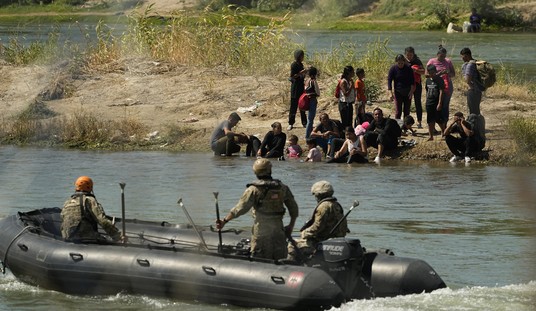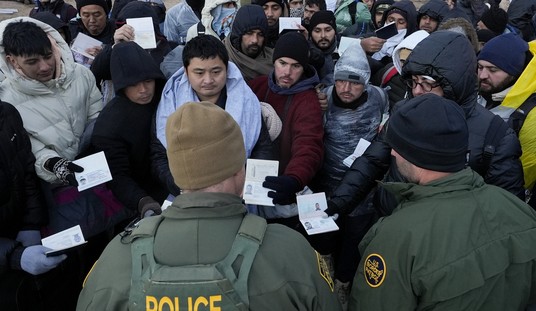Iran launched dozens of rockets at Israel yesterday, causing little damage thanks to the “Iron Dome” system Israel employs for just such occasions. In retaliation, Israel launched a wide-ranging military strike on Iranian assets in Syria. It might have looked proportional at first, but it has now become apparent that Israel has decided to reduce Iran’s ability to operate effectively in Syria at all:
The Israeli military said Thursday that it had bombed dozens of Iran-linked military facilities in Syria, as tensions between the three countries soared.
The army said in a statement that its fighter jets had targeted Iranian intelligence and logistics sites around Damascus, as well as munition warehouses, observation and military posts — what a top official said were most of their facilities in the country. …
From Mount Bental on the Golan Heights, Israeli military spokesman Lt. Col. Jonathan Conricus pointed out where he said an Iranian rocket salvo had fired toward Israel just after midnight. “We saw it was very clear what the Iranians were doing, attacking Israel from Syrian soil,” he said.
Four of the 20 rockets were on target, he added, but were then intercepted, while the rest fell short. Israel responded by hitting 70 Iran-linked sites in Syria. “This was by far the largest strike we have done, but it was focused on Iranian sites,” he said.
CBS This Morning noted that the conflict “dramatically escalated” in Israel’s retaliatory attack:
The dramatic escalation here was the attack by Iran. It’s the first time that Iran’s own military forces have attacked Israel; usually they outsource that to proxies Hezbollah, Hamas, or Islamic Jihad. Israel has been expecting an attack from Iran’s military presence in Syria, which is why they have spent a lot of money fortifying the Iron Dome system over the last few years.
The lack of “proportionality” sends its own message. Israel isn’t interested in proportionality when it comes to attacks on their country. They see it rightly as an act of war, and they also rightly see that war doesn’t require “proportionality.” It requires a forceful enough response to end the war as soon as possible. The only way to deal with an aggressor is to bloody him up enough to take the aggression out of him. “If we get rain,” one Israeli official told CBS’ Seth Doane, “they’ll get a flood.”
Nevertheless, European leaders are already telling Israel as well as Iran to restrain themselves:
In a laudatory speech for [French president Emmanuel] Macron who received the prestigious Charlemagne Prize for strengthening European integration, [German chancellor Angela} Merkel said in reference to Iran and Israel: “We know that this is an extremely complicated situation.”
“The escalations of the past few hours show us that it is truly about war and peace. And I can only call on all sides to exercise restraint here,” Merkel added.
This, of course, is sheer nonsense. The only side that needs to exercise restraint in this situation is the country that attacked first. Israel apparently took care to target only the Iranian installations in Syria, avoiding Russian bases altogether and only attacking Syrian air defenses that attempted to intervene. Iran started the fighting, and if they don’t like the results, they can solve the situation by “restraining” themselves from firing rockets into Israel.
And guess who agrees with that? The government of Bahrain, for one:
طالما ان ايران اخلّت بالوضع القائم في المنطقة و استباحت الدول بقواتها و صواريخها ، فإنه يحق لأي دولة في المنطقة و منها اسرائيل ان تدافع عن نفسها بتدمير مصادر الخطر .
— خالد بن أحمد (@khalidalkhalifa) May 10, 2018
Translation from Microsoft’s Twitter app:
As long as Iran has breached the status quo in the region and has evacuated its troops and missiles, any state in the region, including Israel, is entitled to defend itself by destroying the sources of danger.
“Evacuated” is probably supposed to be “launched,” but the meaning is clear.
By the way, guess who isn’t joining Europe in calling for restraint from both sides? The White House:
Unlike the Obama administration, which told Israel repeatedly while under attack to “use restraint,” Trump administration is not only backing Israel by fully condemning Iran, they’re also calling on all nations to do the same. pic.twitter.com/bKz4BtFZqw
— Katie Pavlich (@KatiePavlich) May 10, 2018
That in itself is quite a change, and it’s a signal that the US has adopted a very realistic approach to the regime in Tehran. At the very least, it’s a signal to Israel as well as Saudi Arabia, Jordan, Bahrain, Egypt, and probably Russia too.








Join the conversation as a VIP Member